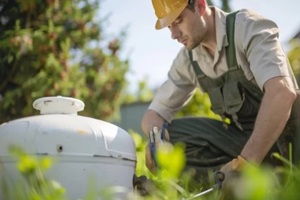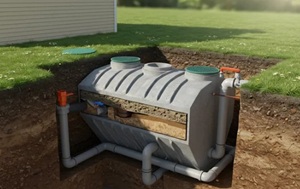
Owning a property with a private well and septic system has many responsibilities, and staying ahead of seasonal maintenance, including getting a thorough well and septic inspection in Maryland, can make all the difference in system performance and water quality.
The changing weather in Maryland brings its own set of challenges, from freezing temperatures in winter to heavy rains in spring, each with the potential to affect how your water and wastewater systems function.
However, adopting a thoughtful year-round approach to maintenance helps prevent costly repairs, keeps water safe to drink, and extends the life of your equipment.
This article outlines a well and septic maintenance calendar that you can use to keep your water systems functioning properly all year round.
Winter Maintenance for Protection and Reliability
Without proactive, protective measures in place, water systems in Maryland are vulnerable to costly damage during cold weather. Exposed lines in well pits or crawlspaces are vulnerable to freezing, so insulating them is an important first step. Drafts in well houses should be sealed, and the sanitary well cap should remain tight, uncracked, and elevated above grade to keep snowmelt from seeping inside.
Any grading near the well should direct water away, thereby reducing the chance of any potential contamination.
Water treatment equipment also requires attention during winter; UV purification systems need functional lamps and clean quartz sleeves, while reverse osmosis filters should be monitored for freezing, which can cause cracking. Any cartridge replacements should follow manufacturer guidelines to maintain performance.
Septic systems benefit from preventative habits during the winter months. Avoid driving or parking heavy vehicles over the drainfield, as soil compaction can limit the system’s ability to process wastewater effectively.
Snow removal equipment should also steer clear of this area. Keeping roof runoff and melting snow away from the septic tank and field helps prevent excess moisture that can stress the system.
Spring Maintenance for Testing and Early Repairs
As temperatures rise, spring is the preferred season for annual well water testing. Maryland’s Department of the Environment recommends testing for total coliform and E. coli bacteria, nitrate, pH, and total dissolved solids at least once a year.
Testing is also advised after any plumbing repairs, changes in taste or odor, or nearby contamination events. If heavy rains or flooding have affected your property, the well should be disinfected and tested before use.

Septic systems should be evaluated during spring, especially if two to three years have passed since the last pump-out. Professional service should include an inspection of the outlet baffles and cleaning of the effluent filter, with the service report kept for future reference.
Walking the drainfield after the ground has thawed is an effective way to spot any potential early warning signs of problems. Any soggy patches, persistent odors, or unusually lush grass over trenches may signal the need for a well and septic inspection in Maryland by a licensed contractor.
Summer Maintenance for Managing High Demand
Warmer weather brings higher water usage, which can place additional, unneeded stress on both well and septic systems alike.
Tracking pressure cycles during these months is a smart habit, as short-cycling can indicate issues like a failing pressure tank bladder or a leak somewhere in the system. You should replace your carbon and sediment filters according to schedule to maintain a steady flow and water quality.
The wellhead area deserves attention and maintenance in the summer. Hazardous materials such as fuels, pesticides, and fertilizers should be stored at a safe distance from the well, with grading that directs stormwater away from it. Doing so lowers the risk of pollutants entering your drinking water.
For septic systems, balancing water use is important; large spikes in usage, such as multiple laundry loads in a single day, can push solids into the drainfield and cause long-term damage. Leaky faucets or toilets should be repaired promptly, and installing WaterSense-labeled appliances can help reduce strain.
Sprinkler systems should never run over the drainfield, as both roots and saturation can disrupt proper operation.
Fall Maintenance for Preventing Cold-Weather Problems
Autumn is an ideal time to prepare systems for the coming winter. The EPA’s SepticSmart Week in September serves as a reminder to review well safety habits and schedule any overdue septic service.
Repairs to well caps or casings should be made before freezing temperatures arrive; a properly fitted, vermin-proof cap can block bacteria from entering during freeze-thaw cycles.
For septic systems, seasonal yard care makes a massive difference. Clearing out your gutters and grading soil so that stormwater flows away from the tank and field lowers exposure to excess moisture.
In areas within the Chesapeake Bay Critical Area or near tidal waters, certain repairs or replacements may require Best Available Technology (BAT) nitrogen-reducing units. Consulting the county health department before planning work avoids delays and compliance issues.
Year-Round Care Leads to Reliable Water and Wastewater Systems

Consistent seasonal maintenance is one of the best ways to protect your well and septic systems, maintain water quality, and avoid unexpected repairs. Knowing what to do in each season helps keep these essential systems operating smoothly for years to come.
At Tri-County Pump Service, Inc., we have been helping Maryland, Virginia, and West Virginia homeowners and businesses care for their entire water cycle since 1991. Our family-owned team brings more than three decades of hands-on expertise in well pump systems, water treatment, septic services, and plumbing.
If it’s been a while since your last inspection or you have noticed signs that your system needs attention, now is the time to act. Set up your service appointment today by getting a free water analysis and estimate online, calling 1-(301)-882-2776, or filling out our contact form.



